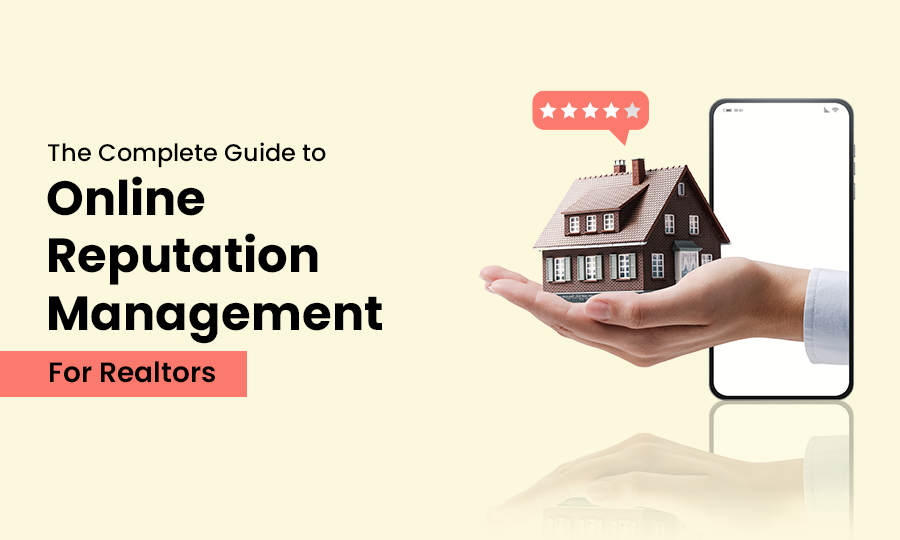Nowadays, people search for almost every type of business online, including real estate agents or firms. This factor emphasizes the importance of effective online reputation management for realtors or real estate agents. The stronger your online reputation is as a realtor, the more likely the clients will choose your expertise over your competitors.
Did you know that 64% of customers are more likely to buy a product from a business with a good online reputation?
Even real estate agents can connect to more clients if they’ve a good online reputation. They can ensure more property transactions and grow their business online with a loyal client base.
Are you a realtor who wants to establish a strong digital image or enhance their online reputation? If yes, you’re at the right place! Here in this blog, we’ll explain how a real estate agent can build and manage their reputation across the web. Explore the complete guide to learn more about the online reputation management benefits, challenges, and beyond.
What Is Online Reputation Management for Realtors?
It’s a process of monitoring and managing how your real estate business is perceived online. It requires real estate agents to take strategic actions based on the insights they collect by monitoring how their potential and existing customers feel about their business.
In simple words, it’s all about influencing public perception by implementing effective strategies. ORM helps realtors build a strong and positive online image and promote it across various platforms to attract new clients.
But what about the protection of your online reputation?
Don’t worry! Online reputation management for real estate agents covers that aspect as well. Before we dive into the strategies to manage a real estate agent’s online reputation, let’s first understand how a positive online reputation works.
How a Positive Online Reputation Works for a Realtor?
When you build and maintain a positive online reputation as a real estate professional, those who are looking for a reliable realtor online –
- Gain a sense of confidence in your expertise
- More likely to prioritize your real estate services over your competitors
- Recommend your real estate offerings to their family and friends
Effective ORM strategies help you make your real estate business more visible online, fostering trust and confidence among potential clients. Realtors can hire a reputable online reputation management agency to seek their personalized services.
Top 12 Online Reputation Management Strategies for Realtors
Are you just satisfied with printing your leaflets and flyers to distribute to promote your real estate business?
Or do you think that whatever image those materials will convey about you as a real estate agent will be good enough to drive new clients?
You’re highly mistaken! These traditional methods for building client trust may not work in today’s competitive digital landscape. Today’s scenario requires realtors to prioritize their online reputation and implement effective digital strategies to establish it.
Below, we’ve discussed the 12 most effective online reputation management strategies for real estate agents. Explore the methods and implement them to meet your real estate business’s online reputation requirements.
Strategy 1: Google Yourself First

To start online reputation management for realtors, you first need to understand where their online reputation currently stands. But how to do it?
The easiest way is to Google your name or your real estate firm’s name. The following are some easy steps to check your online reputation.
- Use an Incognito Mode – You must search your name using an incognito window of Google. It will show search results that aren’t influenced by your browsing history.
Note: Did you know that Google handles 14 billion search queries every day, and 84% of Google users use this browser at least three times a day? Thus, googling your name can provide a complete overview of how your real estate business is perceived on Google.
- Enter Your Full Name – Provide your full name or your real estate firm’s name to Google yourself! You can also try different name variations to get an extensive range of search results.
- Add Keywords – Your firm’s location and services are some good keywords to use. Using these keywords will narrow down the search results. Through this, you can get to see search results that other people might find online when they search for your real estate business in a specific context.
- Check the Top 10 Results – The top 10 results Google provides you when you search for your name are the major ones. Take notes from them and assess the content quality.
- Examine the Links – What do those 10 links contain? Is the content positive, negative, or neutral? Do the links provide accurate information? Or false? It’s time to categorize those search results and note any unfamiliar/unexpected content.
Want to set up a notification alert for the new content on Google about your real estate business? You can set up Google Alerts to monitor the new online content. Here’s how you can set up the Google alert-
Open your web browser and visit google.com/alerts > enter your name or your real estate firm’s name, along with the keywords or phrases that you want to track > click on ‘Show Options’ to personalize the alerts.
Select how often (daily/weekly/real-time), from which sources (blogs/website/news stories), in which languages, and how many results for which you want to receive alerts > select the region or country to monitor > select where you want to receive the alerts (email/sms/push notification) > click on ‘Create Alert’ to active your monitoring
Strategy 2: Claim and Optimize Your Online Profiles
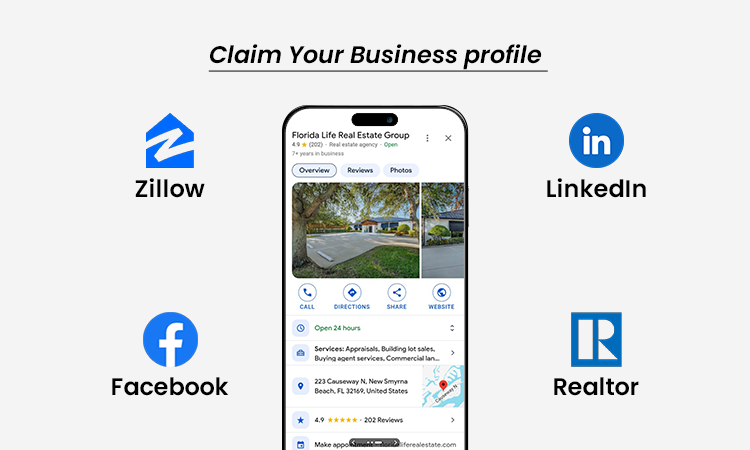
Now that you’ve a clear idea of the retention you’ve online as a realtor, the next step is to claim and optimize your online profiles.
As a real estate professional, you must claim your business profile on major platforms like Google Business Profile (GBP), Zillow, Realtor, Facebook, and LinkedIn. Claiming your business profile on these platforms can ensure that your real estate firm is easily discoverable by your potential clients.
Why does it matter? Through these profiles, you can showcase your real estate expertise and listings, which is important for attracting new clients.
Here are some major profiles where you must claim your business profile.
- Google Business Profile (GBP)
It’s a free tool from Google that allows realtors to manage their online presence on Google Search and Google Maps. It helps real estate agents optimize and manage how their business appears on Google. According to a study by Web4realty, 49% of Google Business Profiles receive at least 1,000 views per month.
Thus, real estate agents need to claim their business listing on Google Business Profile (GBP) to help their clients find and interact with them.
Follow these instructions to claim your GBP listing.
- Visit www.google.com or maps.google.com to search for your business name and location.
- If your business is already listed, you need to click on the ‘Claim the business’ or ‘Manage now’ button.
- After that, you’ll be prompted to sign in with your real estate business’s Google account.
- You can request the ownership of your business listing here.
- Now, it’s time to verify your business – Google will send you a verification code via phone call, email, or text message. Enter your verification code and follow the further instructions appearing on the screen to verify your business.
Note: If you’re connected with Google Search Console, you can verify your business instantly.
Optimize your GBP profile –
- Once your GBP profile is verified, you can access the dashboard.
- From here, you can update your real estate business’s location, add its photos, incorporate new business information, respond to reviews, and more.
- Ensure all this information, including additional details, such as your business hours, phone number, and website links, is accurate.
- You can choose the most appropriate real estate categories from Google’s list.
- You can share updates about your exceptional services, achievements, and community involvement.
- You can link your GBP profile to your social media accounts to increase its visibility.
- Zillow
It is a real estate and rental marketplace company that offers online tools for buying, selling, renting, and financing properties. This platform can help realtors manage their online reputation effectively. To claim your profile on Zillow, you can search for a business and claim it if the account already exists.
Follow these instructions to claim your profile on Zillow –
- You need to visit Zillow.com and click on ‘Sign in’ in the top right corner.
- Then, click on ‘New account’ and register yourself as a real estate industry professional.
- Fill in your business name, phone number, service areas, and license number.
Here are three key steps to optimize your Zillow profile.
- You need to write a description of your real estate business.
- It’s time to incorporate a bio, background, skills, and expertise, along with links to your website and social media profile.
- Don’t forget to add your high-quality photos of your listings.
- Realtor.com
Does the platform sound new? But it is not new in the real estate industry. It is a real estate platform where people can buy, sell, and rent properties. Both consumers and real estate agents can use this tool for their unique requirements.
While consumers can search for homes, compare prices, and explore neighborhoods, the agents can manage their leads, track performance, and directly connect with their clients.
Here are some steps to claim your business profile on Realtor.com.
- Visit the official site Realtor.com, and navigate to the agent profile page present in the dashboard.
- You can search for your business name and click on ‘sign up’ once you find it.
- Enter your email address, create a password, and provide a phone number.
- Verify your MLS (multiple listing service) information using your MLS ID or an active listing number.
- You can also verify your account through your email, and follow the further instructions.
The following are some steps that you need to follow to optimize your Realtor profile.
- Log in to your Realtor profile and navigate to the ‘Manage profile’ section present in the dashboard.
- You need to update your photo and banner image (ensure your profile picture is a headshot). Do write a compelling bio for your business profile on Realtor.
- Don’t forget to add your zip codes, website links, designation, and certifications.
- Sync your NRDS ID to your dashboard (if you’re a member of the National Association of REALTORS®).
- It’s recommended to use relevant keywords in the profile content to make your Realtor profile rank higher in search results.
- Always update your email notification preferences and incorporate your client testimonials to provide social proof.
This is one of the most-used social media platforms, with almost 3.07 billion monthly users. As a real estate agent, you must have an active business account on Facebook.
Fact: 92% of U.S realtors use Facebook for generating qualified leads. This social media platform allows real estate agents to target a wide audience and share engagement posts to attract more clients.
Here’s how you can claim your business profile on Facebook.
- The first step is to log in to your Facebook account.
- Then find your real estate business page. If you cannot find it, visit the ‘Meta Business Suite’ settings page and navigate to ‘Pages’.
- Click on the ‘Request access to a Page’ and enter your page details, including its page URL or name.
- You must choose the appropriate level of access (partial/full control) and submit the request.
Let’s have a look at the steps to optimize your Facebook business page.
- You need to add a profile picture and cover photo.
- Don’t forget to use an influential call to action CTA) button, aligned with your real estate business objectives (e.g., ‘Contact Now’, ‘Connect with Us’, ‘Call Now’, or ‘Learn More’).
- You must share your page on your profiles and invite friends to visit the page.
- We suggest you join relevant Facebook groups and share engaging posts with attractive captions and trending hashtags.
This social media platform is ideal for those real estate agents who want to connect with industry leaders and achieve meaningful professional opportunities. If you’re a real estate agent who has just started their career in the industry and want to establish authority by building beneficial relationships with their industry leaders.
A HubSpot study has revealed that traffic from LinkedIn can generate a visitor-to-lead conversion rate of 2.74%, which is three times higher than both Facebook and Twitter.
Follow these steps mentioned below to claim your business page on Facebook.
- Visit the official website of LinkedIn www.linkedin.com or open the app.
- You need to click on ‘Join Now’. After that, you need to enter your first and last name, email ID, and create a password.
- You can sign up with Google or Apple. After signing up successfully, you need to click on ‘Agree & Join’.
- You can verify your email address by clicking on the confirmation link received through your email.
Here’s how you can optimize your LinkedIn profile.
- It’s crucial to upload a professional headshot for your LinkedIn profile picture.
- Craft a concise headline to convey your expertise and achievements.
- Write a compelling summary to highlight your business goals, experience, and key skills.
- You can showcase your work experience and accomplishments by adding your educational qualifications and work experience.
- Request recommendations from your colleagues and supervisors to add credibility to your profile.
- You can connect with real estate professionals, potential clients, and industry influencers.
Strategy 3: Ask for More Reviews in the Right Way
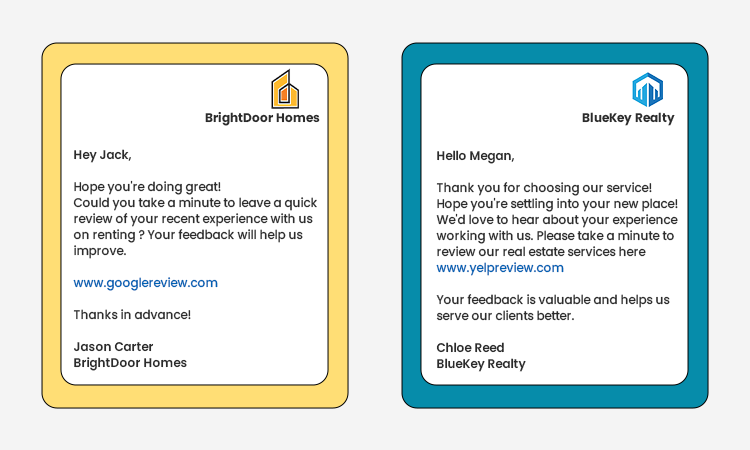
To effectively ask for more reviews, a real estate agent needs to make the process of review submission personalised and easy. Sounds complex? Let’s understand it in detail.
As one of the most beneficial ways of online reputation management for realtors, you need to request reviews from your existing clients. But what if your clients find it difficult to share their reviews? They may not feel encouraged enough to submit their valuable feedback due to the complex process.
So, what you can do is to offer clear instructions and request reviews from your satisfied clients using a friendly tone. But this doesn’t mean that you need to overwhelm them with too many review requests!
Here is a step-by-step guide to effectively request reviews from your customers and manage them as well.
Step 1: Identify your Happy Clients
After a deal closes, you can identify which clients are happy and satisfied with your real estate services. It can be expressed through their verbal appreciation and willingness to engage further. You can identify your happy clients through –
- Enthusiastic responses to your follow-up messages
- Expressed satisfaction with your offerings
- Positive comments
- Willingness to seek services from your business in the future
- Easy availability to refer your real estate business to their families, friends, and peers.
Step 2: Send Simple Review Requests
Now that you’ve an idea about your happy clients, you can send simple messages via email or SMS to them to request their reviews. When you personally connect with your clients to seek reviews, they feel more valued. It’ll showcase how much you value your clients’ opinions and are always eager to deliver the best possible service to your clients.
Here are some examples of review requests; you can take references from these or personalize according to your requirements.
Example 1:
“Subject: Quick question – We would love to know about your Experience!
Hey [Name],
Hope you’re doing great!
Could you take a minute to leave a quick review of your recent experience with us on [buying/selling/renting] [property address]? Your feedback will help us improve.
[Link to your review page]
Thanks in advance!
[Your Name/Your Real Estate Company Name]”
Example 2:
“Subject: Share your review about your experience with [your real estate firm’s name]!
Hello [Name],
Thank you for choosing our service! Hope you’re settling into your new place! We’d love to hear about your experience working with us. Please take a minute to review our real estate services here [link to review platform].
Your feedback is valuable and helps us serve our clients better.
[Your Name/Your Real Estate Company Name]”
Step 3: Provide Direct Links to your Review Platforms
Not receiving enough reviews even after you’ve sent requests to your existing clients?
The reason is not about adding direct links to your review sites in those emails or text messages. Then they don’t know where to share their reviews! Here we’ve explained how you can provide direct links to your review platforms through the review request email or text messages.
For Google:
Go to your Google Business profile of your real estate firm > click on ‘view profile’ > navigate to the ‘Get more reviews’ button > copy your unique review link
For Zillow:
Search for your business name on Zillow > navigate to your profile page > locate the review page link in the upper section > copy and share this URL via email or SMS > embed it on your website as a link
For Yelp:
Visit your Yelp profile > search for your real estate business > navigate to your business profile > right-click on the ‘Write a review’ button on your profile page > select ‘Copy link address’
Step 4: Follow Up with Your Clients
Imagine one of your satisfied clients has just received a single review request from your end, but no follow-ups. It is more likely that the client may have forgotten about sharing their feedback. Thus, follow-ups are critical, especially when it comes to reviews!
You can send follow-up messages through phone calls, email, and even SMS. It will help you address your clients’ queries and potentially strengthen your relationship with them. Effective follow-ups help build trust and often lead to increased sales and customer satisfaction.
It will showcase how much you value your clients’ feedback. However, it’s important to follow up on time just after the clients have sought services from your real estate business. If you follow up after a longer period, you can not receive your desired response from your clients.
We suggest you not to bother your clients with multiple follow-ups within a short period, as they may feel pressured to leave reviews. You can send follow-up messages if the client doesn’t respond within a week.
Pro Tip: You shouldn’t offer incentives to any clients for sharing their reviews. For your clients to review your real estate company, it will appear that you are bribing them. It may erode the client’s trust in your business.
It showcases that you’re only concerned about building your reputation and are less bothered about your clients’ experiences. Rather, you can incorporate QR codes of your review page in your open house signs, promotional flyers, and other materials to collect reviews on the spot.
Strategy 4: Respond Professionally to Reviews
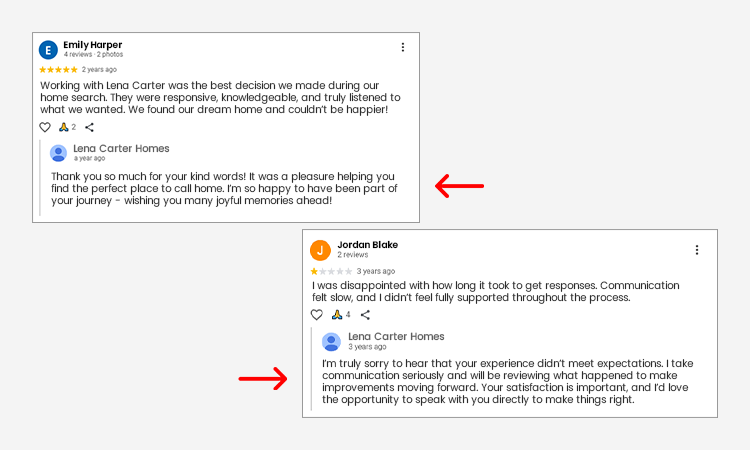
Online review monitoring and responding are two crucial parts of ORM for real estate agents. Once you receive the reviews, it’s time to assess them to understand their nature, whether they’re –
- Positive
- Negative
- Suggestion for improvements
- Neutral
- Fake or spam
As a realtor, you must have a clear idea about the nature of a review. Otherwise, you may not be able to respond to them effectively.
Every review demands a unique response! You cannot reply to both positive and negative reviews in the same manner. Similarly, it’s not recommended to reply to a suggestion in the same way you need to reply to a fake review.
Fact check: 89% of customers expect a response from businesses to their online reviews.
Effective review management plays a crucial role in online reputation management for realtors. Let’s have a quick look at how you can professionally respond to every review you receive as a real estate professional.
- Appreciate positive reviews – You must express your gratitude for the positive feedback and acknowledge their feedback. You can thank the client for taking their valuable time to appreciate your services. Want to personalize your response to make the reviewer feel more valued? Address the reviewer by their name in your response.
Examples:
Here are some examples of how you can respond to positive reviews.
“Thank you for your kind words! We’re so glad you enjoyed your experience.”
“We appreciate you taking the time to leave a review. It means a lot to us!”
- Address Negative Reviews – You must acknowledge the client’s negative experiences and express empathy for the same. You must not argue with them; rather, a simple apology can work in such situations. You can use phrases like ‘We’re sorry to hear that you’re disappointed with your experience of working with us.’ It will showcase that you’re eager to know what went wrong and how you can improve your services.
- Avoid Defensive Language – We suggest you refrain from using accusatory language when you respond to negative reviews. You must maintain your professionalism while responding, no matter how harsh the reviews are. Instead of saying ‘That’s not true’, you can say ‘We understand your experience was not aligned with the usual standards of our real estate services.’
- Handle It Offline – If possible, you can solve the issue offline. Try to offer a private channel of communication (email, phone call, or even a personal visit to your office). It will prevent online conflicts with your clients. Always remember, how you’re responding to your reviews is seen by a worldwide audience. Online conflicts can make you lose a significant number of your potential clients.
- Document the Process – As a real estate agent, you should always keep a record of the negative review and the subsequent action you’ve taken to resolve those. This will be helpful enough for training purposes of your team – they can seamlessly learn how to handle similar reviews.
Strategy 5: Monitor Your Online Presence Regularly

Establishing your real estate business’s online reputation is not enough!
You need to monitor your online presence regularly to have a clear idea of where you stand. There are many effective ways through which you can track your business’s online presence. Tools like Google Alerts can help you keep a regular track of your online brand mentions. Let’s know how you can implement this ORM strategy.
- Set Calendar Reminders
Google Alerts is one of the best tools for setting calendar reminders. You can visit the official website www.google.com/alerts and enter your name or your real estate firm’s name as the search query.
This tool also helps you in customizing your alert settings, such as –
- How frequently do you want to receive the alerts? (Monthly/weekly/daily/real-time)
- Which sources do you want to receive alerts from? (web/news articles/blogs/social media)
- How do you want to receive those alerts? (SMS/email/push notifications)
Calendar Alerts: After personalizing these alerts, you can set them up. Another way is to set monthly reminders through Google Calendar or Outlook Calendar. You need to create a recurring monthly event and set the event title (e.g., Check My Online Reputation).
You can set the event to repeat monthly (on a specific day), so that you don’t need to set it up every month. These tools also allow you to set an alert to remind you a few hours before the event as well.
- Use Reputation Monitoring Tools (BrandYourself/Mention)
You can focus on online reputation monitoring tools like Brand Yourself or Mention, especially those specialized in gathering and analyzing reviews from various sources. A realtor can track online mentions of their firm or services across different channels –
- Online forums
- Social media platforms
- Review sites
- News outlets
These tools typically help in keyword monitoring, providing alerts for brand mentions, and client sentiment analysis. Here are some tips to use these tools in online reputation management for realtors.
- Firstly, you need to determine where your target audience is active and interacts more – social media platforms, review sites, or online forums.
- Then you can pinpoint the keywords most likely to be associated with your real estate business – brand name, service names, relevant hashtags, common misspellings, or variations.
- Choose the tool that specially aligns with your online reputation monitoring requirements.
- You need to configure your selected tool to track the keywords and platforms you’ve identified. You can filter them by language or location, and set up email or in-app notification alerts.
- Track Review Volume, Tone, and Visibility
What should be tracked in an online review to understand your business’s digital reputation?
It’s the volume, peak period of receiving those, sentiment, tone, and beyond. But how do you track all of these? Let’s learn more about this.
- You need to track how many times you’ve received positive and negative reviews. It’ll help you identify the patterns and trends in your online review volume.
- Analyze when you have received the most amount of reviews. The data will help you identify the seasonal trends in online reviews.
- What are the tones of those reviews? Are they positive, negative, or neutral?
- It’s time to go beyond sentiment! You must analyze the other tones used by the reviewers – frustration, excitement, or disappointment.
- You can categorize these reviews based on their tone and sentiment to identify specific issues that require immediate attention. You can find these repeating issues present in your feedback through this review categorization.
Strategy 6: Create Valuable Content to Build Authority

Content is KING! You must’ve heard this before, right?
But do you know that positive content can improve your online reputation? Yes, you heard it right!
Valuable and high-quality content can establish your real estate business’s authority and credibility, as it shows that you’re a knowledgeable
You can start writing a blog or a YouTube channel to cover the local real estate trends, tips, and FAQs. Your potential clients love to know the information you can provide them as a real estate agent. When someone plans to buy or sell a property, he/she is more likely to have multiple questions in their minds.
You need to answer those queries with your content, no matter the type.
From informative blogs to engaging YouTube videos, a realtor can create a variety of content to establish a strong reputation online.
Some Topics for Your Blogs
- Property buying/selling tips
- Investment strategies
- Real estate trends
- Educational content regarding the real estate industry
- Local housing trends
- List of luxurious and affordable properties
- Property taxes
- First-time home buyer guides
- Client success stories
The topic and niche you choose for your blogs depend on the type of audience you want to reach. Are they first-time homebuyers, investors, or sellers? Understanding your audience helps you tailor your content accordingly.
Note: Never forget to distribute your blogs across various online channels. You can promote your blog links through your brand’s social media handles and email newsletters.
Important Topics for YouTube Videos
- Property tours
- Announcement of new listings or sold properties
- Open house previews
- Property highlight YouTube shorts
- Before and after house renovation videos
- Client video testimonials
- Live Q&A sessions
- Interviews/podcasts with real estate industry experts
Bonus Tip! Compelling titles, informative descriptions, and eye-catching thumbnails can make your YouTube videos more attractive. Additionally, relevant tags make your videos reach a wider audience.
Maintain your consistency while uploading videos, as it will keep your potential and existing clients engaged even when they’re not seeking any service from your real estate firm.
SEO Keywords for Your Content
SEO reputation management plays a crucial role here. No matter how good your content is, if it’s not SEO-optimized, you may fail to reach a significant number of audience who may have an interest in your real estate services. You need to optimize your blogs and other content with keywords relevant to your real estate business.
Have no idea about the types of keywords that can rank your real estate content? Let’s have a look!
- Location-based keywords – Best real estate firm near me, home for sale in Los Angeles, waterfront property in (city name), and luxury homes in nearby area
- Property-based keywords – Apartments for rent, commercial real estate,
- Transaction type keywords – How to buy a house, how to sell a house, and investment properties
- Lifestyle keywords – Family-friendly neighborhood, first-time homebuyer, retirement communities, luxury real estate, schools nearby
- Features and amenities keywords – Apartments with pool, landscaped yards, smart home features, high-end amenities
- Service-related keywords – Real estate agent property management services, and rental management services
You can incorporate these keywords in your blogs and other content. You can naturally place these keywords in the titles, headings, subheadings, image alt texts, and even page URLs. An AIESEO study has claimed that webpages that have a keyword in their URL are more likely to get 45% higher click-through rates (CTR) as compared to other pages.
Your SEO-optimized content has more chances to rank higher on search engine result pages, which will result in your real estate business’s improved online reputation.
Strategy 7: Leverage Social Proof on Social Media
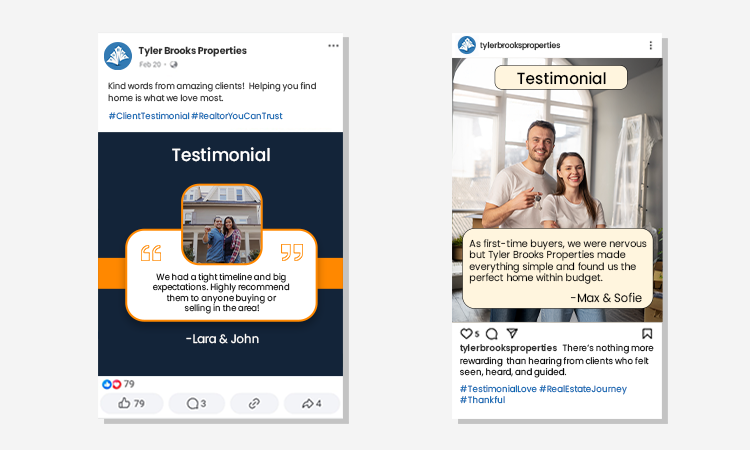
Received positive reviews from your satisfied clients?
Let us tell you, this is not enough! Unless your potential clients are now aware of how satisfied your existing clients are with your services, they may not trust your real estate expertise.
This is one of the most effective strategies of online reputation management for realtors. But the question here is – how can you provide social proof of your brand credibility to your potential clients?
Nowadays, people turn to social media for every need. Even the home buyers are more likely to check a real estate agent’s social media profiles before they decide to invest in their services. They check reviews of their clients and decide whether they should trust the realtor or not.
Did you know that 44% of real estate agents generated at least one high-quality lead from social media in 2020? If effectively used, a realtor can drive a significant number of clients by promoting their positive reviews and other promotional content through their social media profiles.
Here are some unique ways through which you can provide social proof on social media.
- Post Testimonials through Images/Short Videos – Visual content can have a bigger impact on your clients as compared to text-based content. You can request your satisfied clients to shoot their own reviews and share them with you, so that you can post them on your social media. They can also share their images or the property images for better visibility.
- Share Behind-the-Scenes Content – As a realtor, how does your day go? Your potential clients are more curious about this kind of behind-the-scenes content. Shoot videos of your regular day as a real estate agent, meetings with clients, some glimpses of your personal life, dealing with financial transactions, and more.
- Highlight Successful Deal Closings – If your client permits, you can shoot videos with them or take pictures when you close a deal or get a new client. You can post these pictures and videos to announce successful closings of properties or new property listings.
- Use Instagram Highlights or Facebook Pinned Posts – You can highlight your positive client feedback on Instagram and pin posts on Facebook. This will ensure better visibility of your client reviews across the social media platforms.
- Tag Happy Clients – When you share your positive client feedback on social media, you can tag those specific reviewers to personalize that content. It will make those clients feel valued and appreciated!
Strategy 8: Encourage Mentions and Backlinks

Positive brand mentions and qualified backlinks from authoritative sources – these two play a major role in online reputation management for real estate agents. To boost your website’s online visibility and secure valuable backlinks, a realtor needs to consider certain ORM best practices.
Want to know how you can ensure more valuable brand mentions and backlinks? Here are some simple tips for you!
- Target Local Publications – You can target local publications, real estate websites, and news outlets to secure brand mentions and backlinks from them. You can share valuable content and expert insights on those sources to ensure increased content visibility.
- Engage More in Online Communities – Want to improve your content engagement? You can join and actively participate in real estate forums and Facebook groups. You can share your expertise, answer common queries, and promote your real estate website as well.
- Earn Guest Blogging Opportunities – When authoritative websites from your niche promote your blogs, it establishes the authority and credibility of your real estate business.
- Build Networks with Industry Professionals – Collaborate with stagers, home inspectors, and contractors to build meaningful professional relationships. You can also partner with renowned real estate professionals to request that they link back to your site from their official websites or resource pages.
- Leverage HARO – Wondering what HARO is? It stands for Help A Reporter Out! You can utilize it to connect with reputed journalists and bloggers to promote your real estate business. It can often lead to valuable media mentions and backlinks.
Strategy 9: Invest in a Personal Brand Website
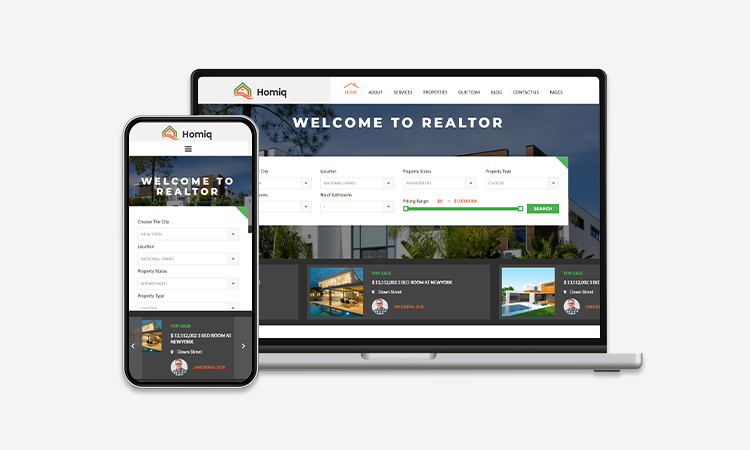
Your website is the virtual storefront of your real estate business. If it’s not capable enough to attract more clients, then it’s not good enough!
Your official website will promote the real estate services you offer, the value and work approach you follow as a realtor, and everything in between. Thus, if you don’t have a professional-looking, informative website, you must invest in building the same.
- Purchase a domain – Firstly, you need to purchase a website domain for your website. Choose a domain name that is easy to remember and not owned by any other businesses. If it is owned by other websites, you can consider the closest alternatives.
- Create intuitive website design – Keep the website design clean and easy to navigate. Imagine one of your potential clients visits your website and wants to check the service page, but can’t due to the complex navigation. He/she may lose interest in navigating your website further and switch to your competitor sites to seek the information they need. Likewise, a user-friendly website will drive more traffic and provide you with enough opportunities to transform your visitors into your loyal clients.
Fact Check: 75% of consumers judge a business’s credibility based on its website design, based on data from the year 2023.
- Share blog posts – Create a separate blog page where you will share educational blog posts on relevant topics related to your real estate business.
- Post testimonials – What’s better than providing social proof on your website? You can share your positive client testimonials on your website to showcase why your clients trust your real estate expertise. Trust us, it will work as word-of-mouth recommendations!
- Incorporate contact forms – It’s extremely crucial to get more contact details of those people who have a genuine interest in your real estate services or in buying or selling properties. When your potential clients fill up those contact forms on your website, you can identify whom to target with your real estate solutions.
- Optimize your website for mobile and SEO – We’ve already talked about the keywords you can use in your content to rank your website higher on search engine results.
You can optimize your website with those keywords and create valuable backlinks. Additionally, you can optimize your social media profiles as well. To learn more about how you can utilize SEO best practices to build and manage your online brand reputation, you can click here.
Is your website mobile-friendly? If not, then you may be losing a significant number of potential clients. According to a 2024 Statista study, 62.54% of global website traffic comes from mobile phones.
- Link your site – you must link your site to all your social media handles and review sites. So that whenever you visit your social media profile or review sites you can have easy access to your website as well. Apart from this, you can interlink your webpages within your site to ensure better traffic and visibility.
Strategy 10: Prioritize Digital PR

In online reputation management for realtors, you need to leverage digital PR as well. It requires you to build a strong online presence and actively engage with the audience.
It all depends on how well your relationships are with your potential and existing clients – the more trust they have in your expertise, the more likely you are to attract new clients.
The following steps will help you shape public perception and foster client trust.
Step 1: You need to build a robust website – well-designed, user-friendly, and SEO-optimized! Don’t forget to highlight your properties with high-quality images and videos. Clear calls to action will encourage more visitors to take the desired actions.
Step 2: Have good content on your website? If not, then you must start developing high-quality content to attract and engage your target audience. You can create blog posts, articles, videos, and infographics related to the real estate industry, property investment, and the like. Distribute them across various online channels.
Step 3: Share engaging content on your social media profiles. It will provide you with more opportunities to interact with your followers. You can run targeted ad campaigns to make your reach wider.
Step 4: As a realtor, you need to monitor your online reputation, such as your mentions and reviews. You need to respond quickly to every comment or review you receive across the web. Encouraging your satisfied clients to share their reviews on popular review sites like GBP and Yelp is a great idea! A proactive approach to managing both positive and negative reviews can help you maintain professionalism and a positive digital image.
Strategy 11: Online Reputation Crisis Management
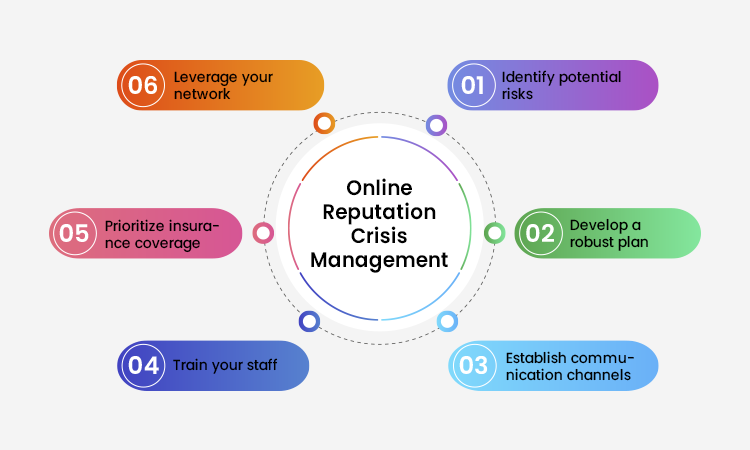
A reputational crisis can occur at any time, often with no prior signs.
The only thing you can do to prevent the damage is to take necessary precautions well in advance and manage the situations like a PRO. A real estate agent can implement effective online reputation crisis management strategies.
Sounds complex? Let’s have a brief idea of how you can manage a realtor’s online reputational crises.
How to Manage Online Reputational Crises a Realtor Can Face?
There are various types of online reputational crises you can face as a real estate agent, such as –
- Negative reviews
- Inconsistent online information
- Actions like fraud, misrepresentation, or violation of real estate laws
- Failure to respond to negative reviews ‘
- Lack of transparency
- Lack of digital presence
- Too many fake or spam reviews
Online reputation crisis management requires you to identify the potential risks and create a comprehensive response plan. Here’s how you can manage these online crises.
- Identify potential risks – You can conduct regular property inspections and assess the real estate market fluctuations. It will help you analyze legal and regulatory changes.
- Develop a robust plan – Now, it’s time to outline procedures for various crises, like legal disputes, spam reviews, or negative publicity.
- Establish communication channels – You must ensure clear and consistent communications with clients, staff, and other stakeholders during a crisis.
- Train your staff – Do your staff have enough knowledge about reputational crisis prevention? If not, you must equip your staff with knowledge and skills to handle an online reputational crisis of your real estate firm.
- Prioritize insurance coverage – Don’t forget to protect your real estate business and assets with valuable insurance policies.
- Leverage your network – You can tactfully use your professional connections to seek guidance and support during your crises.
Strategy 12: Influencer Collaborations

In online reputation management for realtors, influencer collaboration involves leveraging trusted voices to reach a broader audience and promote a real estate business. When a realtor collaborates with social media influencers in their niche, it builds the realtor’s credibility and helps them showcase their properties authentically.
In simple words, a realtor can make their business reach the audience of influencers. As a real estate professional, you can generate qualified leads who are interested in your real estate expertise.
Here are five easy ways to improve their online reputation through influencer collaboration.
- Identify which influencers can promote your real estate business most effectively.
- Choose those whose audience aligns with your target market and has a genuine interest in home buying, property investment, and related content.
- Try to collaborate with influencers on content that feels natural and genuine. It will help influencers speak from their own experience and perspectives, rather than only reciting your marketing scripts.
- Request your influencers to create engaging content like virtual tours, property highlights, and neighborhood features. You can plan those through videos, live streams, and interactive content.
- Promote open houses with the help of the influencers and encourage the followers to reach out for consultations.
- We suggest you build strong and long-term relationships with the influencers through consistent communication and transparency.
6 Key Benefits Realtors Can Achieve with Online Reputation Management Strategies
Real estate is one of those businesses that requires professionals or firms to have a good reputation both online and offline. This is mostly because purchasing land or properties involves a huge emotional and financial commitment.
Thus, your clients need to be confident enough that they’re not investing their money in unreliable real estate services.
Another crucial reason! Today’s consumer habits and reliance on agents for land or property purchases have undergone significant changes in the last few years. They turn to the internet when searching for a property or a real estate agent.
Fact: According to a 2024 study, 43% of home buyers are more likely to search online, while many of them connect with a real-estate agent.
Now that you already know how you can manage your online reputation, you must have a clear idea of the benefits you can leverage with it. Let’s have a look!
- Builds Trust and Credibility
The practice of buying and selling land and properties involves huge financial involvement. For which, the buyers require to have complete faith in the real estate agents. Effective online reputation management for real estate agents helps the professionals establish a strong and positive digital image.
It builds credibility for your real estate and generates a sense of trust among your potential clients. They become more likely to prioritize your real estate services over your competitors.
- Helps Discover Potential Clients
Seeing your positive online reputation, more potential buyers will trust your real estate expertise and contact you for their requirements. When you have a positive online reputation, it makes it easy for potential clients to find you on the search engine results page. Likewise, you discover those who have a genuine interest in seeking real estate services from you.
This happens because your positive online reputation informs Google about how engaging you are with your existing clients. Google ranks your website higher so that more visitors see and visit it.
- Optimizes Client Experiences
Online reputation management for real estate agents helps you in actively engaging with customers. It requires you to respond to reviews and feedback and effectively address your clients’ concerns.
It showcases that you value your clients’ opinions and are committed to providing a positive experience to them. And, this leads to increased client satisfaction and loyalty.
- Improve Online Visibility and Search Engine Rankings
As an ORM strategy, you need to create and optimize positive content, such as reviews, articles, blogs, and FAQs. When you optimize your content with relevant keywords, it becomes more visible online, and so as your website.
Similarly, search engines like Google rank well-optimized websites higher. As a result, your real estate website achieves a higher search engine ranking, which makes it easier for your potential clients to find your real estate business online.
- Helps Acquire New Clients and Retain Existing Ones
Your positive online reputation works as personal recommendations. Additionally, it plays the role of a marketing tool. When your potential clients see a strong and positive digital image of your real estate business, they become more likely to trust you and invest their money in your offerings.
This way, ORM strategies help you attract those clients who are looking for a real estate business with positive reviews and a solid online presence. Similarly, ORM requires you to engage with your existing customers and promptly address their concerns. You can ensure repeat business and retain your customers for a longer period.
- Ensures Revenue Growth
Why have you prioritized online reputation management strategies for your real estate business? To increase your sales and overall revenue, right? Effective online reputation management helps you attract new customers and retain the existing ones, which is directly associated with your business’s revenue growth.
According to a study, businesses with an average star rating of 4 stars or higher can generate 32% more revenue than those with lower ratings. Your business can achieve a competitive edge in the real estate industry. It makes your real estate business more appealing to your potential customers and drives more revenue to your business.
6 Common Online Reputation Management Challenges Realtors Can Face
As a real estate agent, you can leverage multiple benefits with the effective application of online real estate reputation management strategies. Similarly, you can face some common challenges while applying those strategies.
It requires you to do SMART work to navigate this complex industry. But once you identify these challenges, it’ll be easier for you to prevent their negative impacts on your business.
Want to know which challenges you can commonly face in online reputation management for realtors? Let’s have a look.
- Managing Client Expectations – Your potential and existing clients may have unique expectations from your business when they decide to seek your real estate services. Sometimes, you may feel pressured or find it difficult to manage your client’s expectations. However, you can meet those expectations if you closely engage with your clients and understand what they require.
- Handling Negative Feedback – When you handle negative reviews, it is more likely to result in miscommunications. Because you may need to be involved in challenging negotiations and other issues that are beyond your control. It depends on how tactfully you respond to such reviews.
- Maintaining Consistency – Do you have a large team? If yes, you may experience inconsistencies in client experience as different people handle different clients. The challenge here is that even if one member of your team poorly interacts with your clients, it can tarnish the reputation of your entire team.
- Responding to Reviews Timely – Sometimes, you may not be able to respond to your reviews timely due to various reasons. Keeping track of Yelp business reviews and Google reviews requires a significant amount of time. Failing to reply in a timely manner can make your clients even more unhappy and unsatisfied with your real estate business.
- Dealing with Fake Reviews – As a real estate agent, you can encounter malicious and spam online reviews. Sometimes, you may not be able to identify fake reviews or determine the best action to address those issues.
- Balancing Personal and Brand Reputation – Your personal reputation as a real estate agent is directly associated with your business, since they often present themselves as an online image. It increases the need for you to keep up with a constant favorable online image. Additionally, you may face difficulty in handling both your personal and business reputation as a realtor.
FAQs
The following are some frequently asked questions about online reputation management for real estate agents.
It depends on your firm’s online reputation requirements. If you lack the ORM skills and knowledge to implement the strategies, you can consider hiring a reputable online reputation management agency for your real estate firm. Furthermore, if you don’t have an expert ORM team, you can seek professional services from an agency.
If the review is honest, specific, and precisely highlights a realtor’s strengths (communication skills, market knowledge, and crisis management capabilities), it can be considered a good review for a real estate agent.
Additionally, the review must be respectful and focus on the positive attributes of the real estate services a realtor offers, such as how the realtor helps the clients with buying and selling properties.
You can email your existing satisfied clients who’ve recently sought services from your real estate business. Adding the links to your review sites in the emails will encourage them to share their reviews regarding their experience with your business.
If they don’t respond, you can send follow-up emails to remind them about sharing their reviews. On the other hand, focus on providing excellent service and making the process of submitting reviews easy for your clients. You can also actively promote your positive reviews through various channels to attract more client feedback.
It’s not very uncommon to receive a fake or unfair review as a real estate agent. You need to tactfully handle such reviews and avoid escalating such situations. Otherwise, it can cause severe damage to your brand reputation.
You can either directly contact the reviewer and communicate with them to request the removal, or report the reviews if the situation demands. However, handling fake or spam reviews requires you to implement certain effective strategies to ensure their removal.
We cannot specify a timeline to see the exact results from your online reputation management efforts. It depends on various factors, such as the current condition of your online reputation as a real estate agent, the strategies you’ve implemented, and, of course, the severity of your existing online reputational issues.
You can definitely notice some improvements in your online reputation within weeks, but significant changes may require several months of your consistent ORM efforts
Conclusion
Online reputation plays a crucial role for realtors as it must be convincing enough so that people can easily trust them and consider investing their hard-earned money in their services. All it takes is implementing effective online reputation management strategies!
If rightly implemented, you can leverage an extensive range of benefits regarding your real estate business’s digital image. Our comprehensive guide to online reputation management for realtors will help you understand every detail regarding the strategies you need to implement to build and manage your online reputation.
If your online reputation is already damaged to a certain extent, you can seek professional online reputation monitoring services from a renowned agency.

